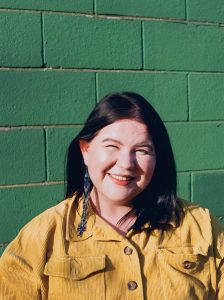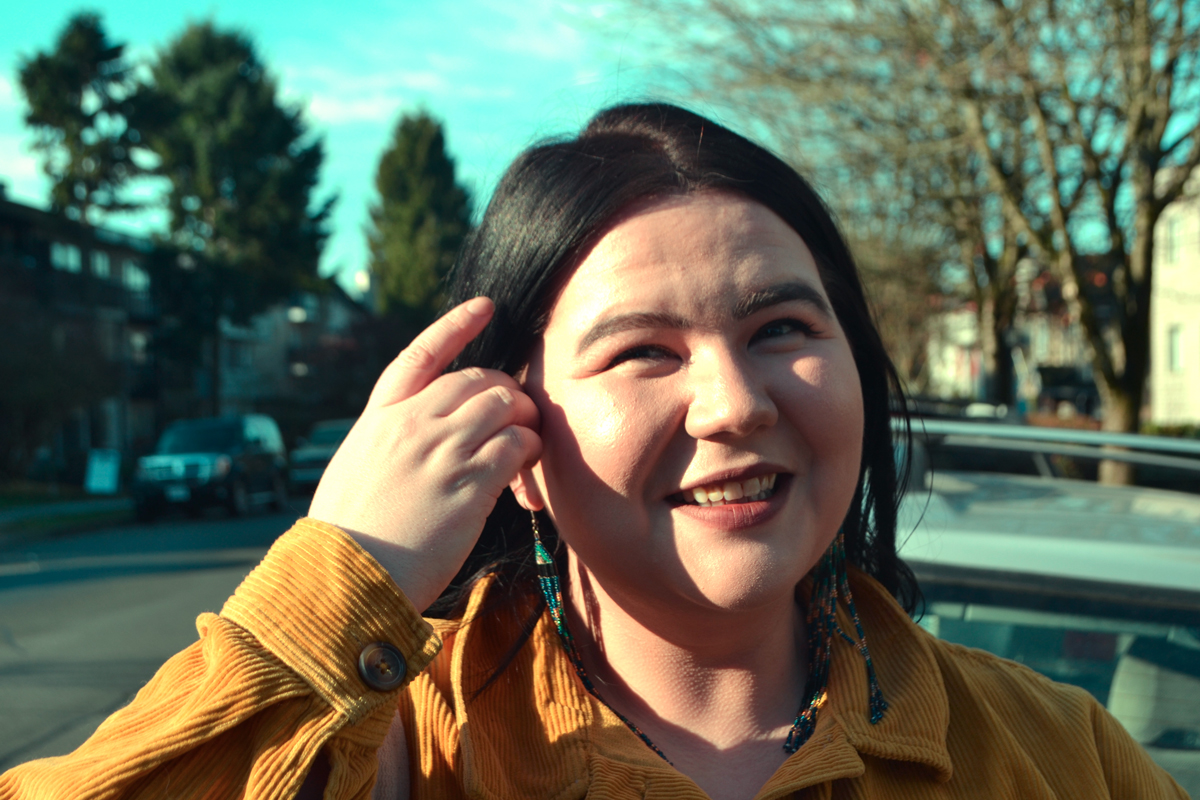Samantha Marie Nock is a Cree-Métis woman whose family is from Sakitawak (Île-À-La-Crosse), North Saskatchewan. She has been living, working and writing in Vancouver for the past ten years; and has since been observing and experiencing the rhythms of life that shape relationships to land and to people, and reflecting them back in work that is radically true.
Nock’s writing has been included in magazines such as Shameless, SAD and Guts, however recently her voice has taken on a new medium through her podcast Heavy Content, which addresses the harmful exclusion or misrepresentation of fat bodies in mainstream media.
“I didn’t really plan to do a podcast like Heavy Content, talking about body politics,” Nock admits. The podcast was created out of her response to a trailer for the Netflix show Insatiable, as a way to have open conversation about fat representation in the media. “It also is a way for me to think about these things for myself,” Nock shares, “because a lot of my writing, and this podcast, has been part of my own journey of self-acceptance and loving my own body.”
Representation is a personal issue for Nock, as much as it is a political one. “I often don’t see a lot of myself represented in the media,” she admits, “And there’s one part of me that doesn’t really blame the media. Like, ok, yeah, I’m a fat mixed woman who’s from these really specific places and who has had specific experiences[…] There are little bits I can see, but in terms of seeing the whole picture … that doesn’t happen in one character, or in one piece.”
However, between seeing parts of her identity in film/TV such as Dumplin’ and Shrill, or in literature, such as Half Breed (Maria Campbell) and A Really Good Brown Girl (Marilyn Dumont), Nock has been able to “hodge podge together things that I can read, watch or listen to that make me feel more whole.”
Heavy Content takes on the challenging questions surrounding media representation. For example, in her episode “The Problematic Fave,” Nock observes that the media repeatedly shows women — especially women who are not considered normatively desirable — seeking validation from straight, cis, white men, and other figures of power. The episode raises the question of whether the media is successfully portraying complicated issues — such as internalized racism and internalized misogyny — or is merely reinforcing their dangerous and toxic ideals.
“When you have a body that runs against the norms, and isn’t considered normatively desirable, you definitely look for those classic figures of desirability to look at you and want you.” Nock explains, “I’ve definitely hunted out what I thought were good, hot, straight, white men to think I was hot, too. Like, ‘Once I get that then obviously I’m like everyone else, and everyone will think that I’m hot, and it’s ok, and everything’s ok – right guys?’ Which is so normal. And I think it’s so important to have depictions of that experience, because if we don’t, we’re just lying to ourselves. But, I think what’s important in those depictions, too, is moving beyond it.”
“When we’re undoing internalized misogyny, or internalized racism, or internalized self-hate, it’s a really complicated, messy thing,” Nock continues, “And we’re going to make mistakes and we’re going to do shitty things. But, what’s important is our accountability, and our care for each other. When we have these depictions of people living this very real process, we’re going to create more conversation and create empathy for each other.”
Part of the complex and harmful structures surrounding body politics that Nock addresses in Heavy Content is the false hierarchy that is placed on romantic and platonic relationships, a hierarchy that undermines those who are excluded from mainstream ideals of desirability. “What’s been really helpful for me is to dismantle that hierarchy,” Sam shares, “Loving everybody equally, all your friends and all your partners, in ways that you’re not reserving specific care for specific people, depending on these antiquated and arbitrary distinctions we have for relationships.”
Nock describes love that defies the boundaries of romantic and platonic — love that is reciprocal and caring — as decolonial and radical love. “It really takes away that idea of scarcity that capitalism and colonialism loves to put on everything,” she explains, “That there’s not enough of everything and we all have to fight for it. That can be resources, or that can be literal care.” Nock claims that “if we can work together and re-imagine this, there’s not going to be a scarcity of care.”

While radical and decolonial love might be fairly absent from media representation, it is visible in literature, in the works of writers such as Billy-Ray Belcourt and Leanne Simpson.
“I think that radical and decolonial love obviously is open for everybody and is something that everyone needs to experience and work towards,” Sam observes in reflecting on the media’s absent representation of decolonial love, “it’s folks who’ve lived under immense marginalization […] under colonialism, who are looking for ways to love and live that aren’t colonial. And so we’re looking for that decolonial love, and what that means for us […] And obviously we’re not the ones that are at the helm of making media – especially popular media – so [those stories are] not quite out there yet.”
For Nock, decolonial love contains all aspects of radical reciprocity, tenderness and care. Although, she admits, “Tenderness and radical tenderness is something that I struggle with [ …] I think especially for fat folks, and especially, especially, for racialized fat folks, we don’t get tenderness shown to us […] It’s no secret that Indigenous people aren’t exactly treated with tenderness in this country.”
Radical tenderness requires attention and respect. “I hate the pressure that I feel exists in a lot of alternative communities or artist communities and queer communities to be this radical, tender thing, ‘cause I’m like ‘Oh that is not me.’ But, it’s also super cool and amazing to work on yourself and to learn how to accept tenderness and be tender.”
Nock explores these ideas of radical tenderness, of decolonial love, and of her relationships with people and with the land through her writing. Several of Nock’s poems include Cree words, specifically when she is referring to the land.
“There is a very simplistic reason why I put Cree in my poems,” Nock tells us, “For me it’s a way to re-claim and use those words, and it’s a way to be disruptive on the page for readers who don’t know the language, for them to stop and be like, “Oh, what is this? Why is this uncomfortable?” And also, it is a way for me to begin to reclaim those things that have been lost through colonial trauma, a way for me to use my language and a way for me to re-think of things with Cree, and bring that world view back into my own writing, and my own brain.
A lot of the words I use are often words for plants and other things, because one part of me just loves to know the Cree words for plants I see around. I just love to know that. And it is a little bit of a reclamation — like, no this is what this is called. We may call it this, but this is the name for this plant, and I just want you to know that.”
 Although Nock’s writing is not always strictly related to body politics, there is a relationship between the body and the land, perhaps not unlike the relationship between the language and the land that her writing brings to attention. “I don’t think that any of our bodies are separate from the land,” Nock reflects. “This is something that is complicated because of colonization and because of losing so much culture, but in terms of looking at ways that I may honour [the] deep responsibilities I have to my ancestors, and the ones that came before me, I think this all is definitely rooted back to the land. We all exist because of the land, and my body is no different than the bodies of other animals that are from this place […] It all begins and ends with the land.”
Although Nock’s writing is not always strictly related to body politics, there is a relationship between the body and the land, perhaps not unlike the relationship between the language and the land that her writing brings to attention. “I don’t think that any of our bodies are separate from the land,” Nock reflects. “This is something that is complicated because of colonization and because of losing so much culture, but in terms of looking at ways that I may honour [the] deep responsibilities I have to my ancestors, and the ones that came before me, I think this all is definitely rooted back to the land. We all exist because of the land, and my body is no different than the bodies of other animals that are from this place […] It all begins and ends with the land.”
“Every single person on this earth, regardless of where you’re from or who you are, has a responsibility to the land, to earth,” Nock continues, “And maybe you don’t have the same ingrained connection, because you’re not living on your ancestral land, or you’re so far displaced through colonial settlement or through force. That looks different for a lot of people, and it’s complicated. But at the end of the day, we all are responsible to this place, regardless of how you got here and regardless of who you are. And so I think really working on your own relationship with what that means, and your own relationship with the land you’re on, is really important, and that’s a sign of respect to the peoples whose land you’re on.”
As Nock continues with her work, it is this exploration of decolonial love and creating communities of care that propels her forward. Nock reflects that a lot of her past work has been focused on hurt, and she is ready to focus more and more on creating futures.
Regarding Heavy Content, Nock is excited to start incorporating more interviews and using them to build stories around a particular topic. “The conversations I’ve gotten to have with people through the podcast have been absolutely amazing,” Nock enthuses. “That’s what my goal was, and is: to open up conversations and to create space to have those conversations in ways that people feel cared for.”
As her work continues to address issues of representation, and to promote love and care, Nock reflects that success does not lie in the capitalist notion of production, but rather in the ability to notice, to pay attention. For Nock, success is “a part of just slowing down […] and focusing on what people are experiencing and what you’re experiencing through it.”
“Be it body politics or ingrained racism in our communities, or decolonization, or resiliency,” Nock reflects, “just creating spaces, having artists and content creators create space where we can have these conversations in a safe and good way, I think is what success should mean.” In her honesty and her attention, Nock’s work is opening space for connection and for care.


